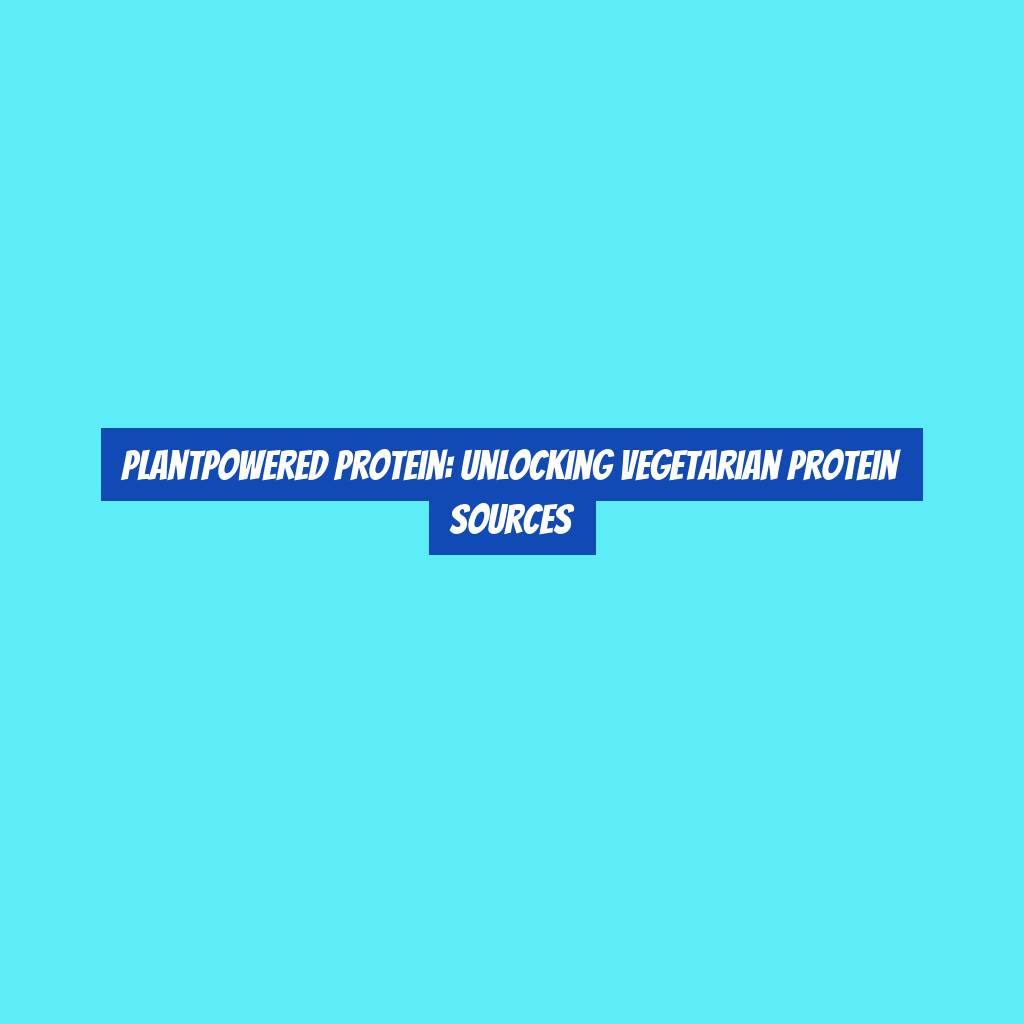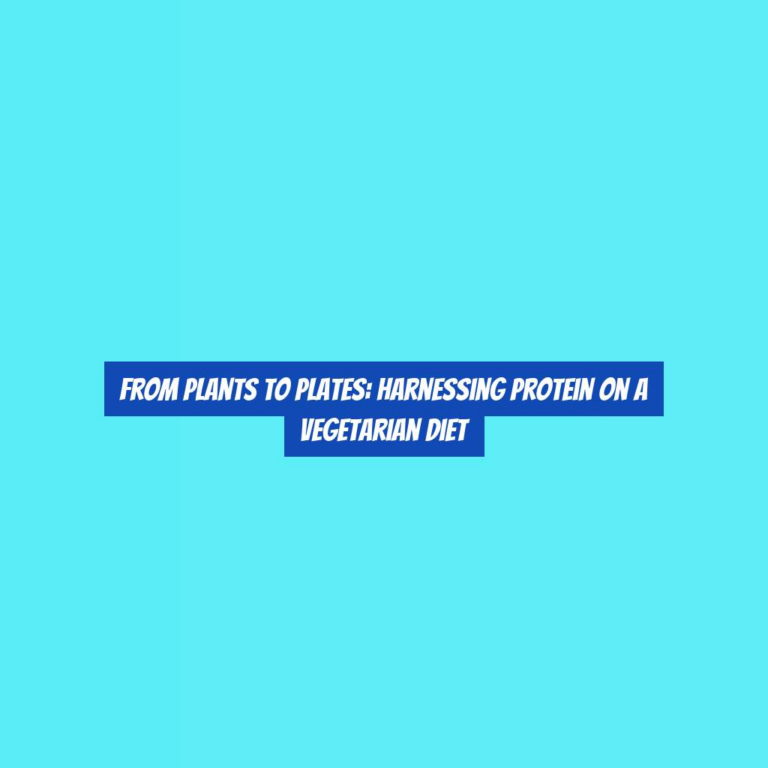PlantPowered Protein: Unlocking Vegetarian Protein Sources
Unlocking the potential of plant-powered protein sources is like opening a treasure chest of nutritional benefits. You might not realize the sheer variety and quality of protein that can be derived from vegetarian sources.
From humble legumes to nutrient-dense nuts and seeds, and even the surprising protein content of grains, thereG??s a world of plant-powered protein waiting to be discovered.
But where do you begin? And what delicious recipes can you create with these vegetarian protein sources?
The Power of Plant-Based Protein
If youG??re looking to boost your protein intake with plant-based options, youG??ll be pleasantly surprised by the power of these sources. Plant-based proteins arenG??t only rich in essential nutrients but also offer a wide variety of options to suit your taste and dietary preferences.
Legumes, such as lentils, chickpeas, and black beans, are excellent sources of protein and can be easily incorporated into soups, salads, and main dishes.
Nuts and seeds, like almonds, chia seeds, and pumpkin seeds, arenG??t only packed with protein but also provide healthy fats and essential minerals.
Quinoa, a versatile grain-like seed, is a complete protein, meaning it contains all nine essential amino acids required by the body.
Tofu and tempeh, made from soybeans, are popular plant-based protein sources that can be used in a variety of dishes, from stir-fries to sandwiches.
Additionally, plant-based protein powders, derived from sources like pea, hemp, or brown rice, offer a convenient way to increase protein intake, especially for those with active lifestyles.
With these powerful plant-based protein sources, you can easily meet your daily protein needs while enjoying a diverse and delicious range of foods.
Exploring Legumes and Pulses
Now, letG??s uncover the nutritional benefits of legumes and pulses as powerful sources of plant-based protein.
Legumes and pulses, such as lentils, chickpeas, and black beans, are nutrient powerhouses. They arenG??t only rich in protein but also provide essential vitamins, minerals, and dietary fiber. A single serving of cooked lentils contains about 18 grams of protein, making them an excellent choice for vegetarians and vegans looking to meet their protein needs.
In addition to protein, legumes and pulses are packed with iron, potassium, and folate, contributing to overall health and well-being. These plant-based sources of protein are also low in fat and cholesterol, making them heart-healthy options for individuals looking to maintain a balanced diet.
Furthermore, legumes and pulses are versatile and can be incorporated into a wide variety of dishes, including soups, salads, and stews. Their adaptability and ability to absorb flavors make them a popular choice for creating satisfying and flavorful vegetarian meals.
Nuts and Seeds: Protein Powerhouses
Utilize nuts and seeds as potent sources of plant-based protein to enhance your dietary intake. These tiny powerhouses are packed with essential nutrients and can be easily incorporated into your meals. Almonds, for example, offer about 6 grams of protein per ounce, while pumpkin seeds provide around 5 grams of protein per one-ounce serving. Whether you sprinkle a handful of seeds onto your salad or enjoy a nut butter spread on whole grain toast, nuts and seeds can significantly boost your protein intake.
Furthermore, nuts and seeds are rich in healthy fats, fiber, vitamins, and minerals, making them an excellent addition to any vegetarian or vegan diet. Chia seeds, for instance, arenG??t only a good source of protein but also contain omega-3 fatty acids and are high in calcium. Additionally, these plant-based protein sources are versatile and can be used in both sweet and savory dishes. You can blend them into smoothies, top your yogurt with a mix of nuts and seeds, or even use them to create delicious energy bars.
With their nutritional benefits and culinary flexibility, nuts and seeds are undeniably valuable protein sources for a plant-powered diet.
Unveiling the Protein in Grains
Discover the protein-packed potential of grains as an essential component of your vegetarian or vegan diet. Grains arenG??t just a source of carbohydrates; they also offer a significant amount of protein to support your dietary needs.
When incorporating grains into your meals, consider the following:
-
Quinoa: This super grain is a complete protein, containing all nine essential amino acids. ItG??s also high in fiber and rich in minerals, making it a nutritious choice for your protein needs.
-
Buckwheat: Despite its name, buckwheat isnG??t related to wheat and is gluten-free. It provides a good amount of protein and is versatile for use in dishes like porridge, pancakes, and salads.
-
Brown rice: This staple grain is a great source of plant-based protein and can be easily incorporated into various recipes. It also offers essential nutrients such as manganese and selenium.
-
Amaranth: Known for its high protein content, amaranth is a gluten-free grain that can be cooked and enjoyed similarly to rice or quinoa. It also provides an array of vitamins and minerals for a well-rounded diet.
Plant-Powered Protein Recipes
Looking to add more variety to your vegetarian or vegan diet? Consider incorporating these plant-powered protein recipes, building on the protein-packed potential of grains mentioned earlier.
Start your day with a protein-packed breakfast by trying a tofu scramble with spinach and cherry tomatoes.
For a satisfying lunch, whip up a quinoa and black bean salad with a zesty lime dressing.
When dinnertime rolls around, experiment with a hearty lentil and vegetable stew or a flavorful chickpea curry.
Snack time? Roasted chickpeas seasoned with your favorite spices make for a crunchy and protein-rich option.
And donG??t forget about dessert – black bean brownies or chickpea blondies are delicious ways to sneak in some extra plant-based protein.
Whether youG??re a seasoned cook or just starting out, these recipes are easy to follow and sure to please your taste buds.
Conclusion
So whether youG??re a vegetarian, looking to reduce your meat intake, or just wanting to add more variety to your diet, plant-powered protein sources are a great option.
From legumes and pulses to nuts and seeds, and even grains, there are plenty of delicious and nutritious options to choose from.
Try out some of the plant-powered protein recipes and see just how satisfying and flavorful vegetarian protein can be. You might just discover a new favorite dish!

